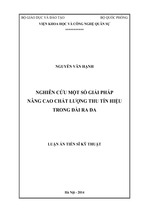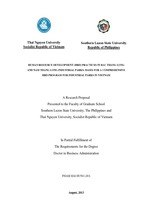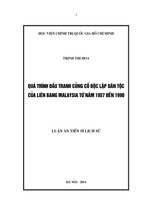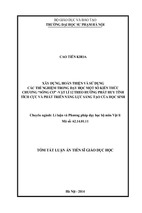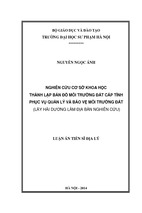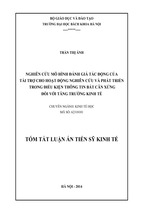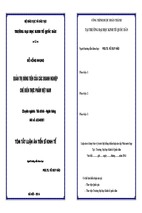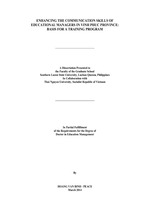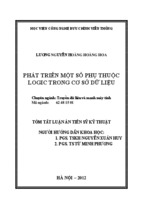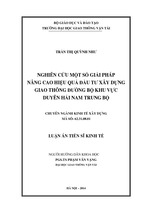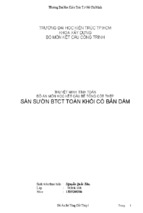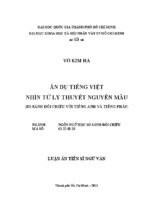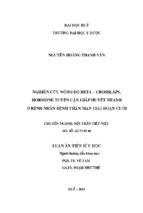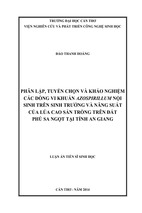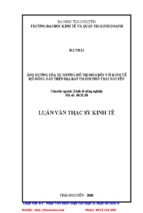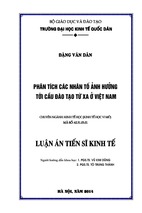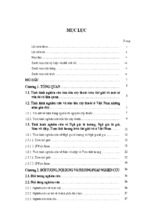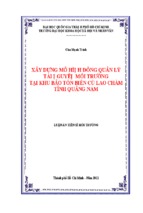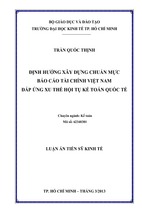Introduction
1.
Importance of the thesis
SNA is the system of accounts closely related with each other. It is composed
of general economic indicators presented in the form of accounts to reflect the social
reproduction and gross domestic product within a certain period (usually a year). The
basic purpose of the SNA is to provide information for macroeconomic analysis,and
policy making to lay foundations for monitoring, managing and reacting to the
economy. During the opening process, integration of the SNA applied uniformly
throughout the country is an objective necessity.
Transport is one of the key industries, are indispensable in the economic
structure of each country. The exact value-addeddeterminationin the transport sector
(VAvt) will help ensure the accuracy and reliability of the gross domestic product
(GDP), thereby contributing to improve effectiveness and efficiencies ofthe decisions
on the socio-economic development.
Since SNA is formally adopted in our country (1993), there have been a
number of researches related to the method calculating VA and VAvt. On these
perspectives, this research has addressed and clarified some issues, which are more or
less related to the VA and VAvt such as the method calculating production value in
national accounts reporting regimes; Statistical information system of the road
transport in our country; methods calculating the production value of the transport
sector at current prices in Vietnam etc. ...
However, so far in Vietnam, no in-depth research referring to the complete and
comprehensive methods of collection, calculation and analysis of VAvthas showed
the contribution of this sector to the national economy. The research
perfectingcalculating and analytical methods of VAvt is not only meaningful in terms
of methodology, but it also contributes to improve transport sector statistics in our
country in the future.
Wishing to practically contribute to improve the accuracy and reliability of
VAvt indicators, better meetthe needs of transport statistics, and economic
information statistics in general, the researcher selected the title of my doctoral
dissertation as “improvements in the value - added calculations and analyses in the
Vietnamese transportation industry”.
2. Objectives of the research
The thesis of improvements in the value- added calculations and analyses in
Vietnam transportation consists of
1
- Clarifying the VAvt method according to SNA.
- Studying the situation, improving and proposing the method of calculating,
analyzing VAvt Vietnam
- Studying the current problems, and proposing to improve the statistical information
system for the calculation and analysis of VAvt Vietnam
- Testing and analyzingVAvtin Vietnam Railways in the 2008-2012
Period
3. Subject and scope of the research
Subject of the research is the calculation and analysis of VAvt Vietnam
Scope of the research:
- Focusing the research on the method of calculating the current value of the
VAvt Vietnam of the SNA department according to the General Statistics Office for
the transport sector nationwide.
- Improving the calculation of VAvt according to the currenttransport sectorof
the SNA department and the method of production.
- Improving the analysis of VAvt Vietnam according to the transport sector.
- Improving the information source serving the VAvt Vietnam under the
direction of the researcher.
- Testing and analyzing VAvt Railways 2008-2012.
4. Research methodology
To accomplish the research objectives, the thesis will use a combination of the
following methods:
(1) Literature review: Collect and analyze some articles and works related to
the thesis topic to inherit and develop their research, and prove that the subject of my
thesis is not a duplicate topic, except for a new research.
(2) Information collection: To obtain a theoretical basis, legal basis and source
of data for the calculation and analysis of VAvt, the researcher gathered legal
documents relatingto the statistics field in general and Statistics in the transport sector
in particular; materials (including books, newspapers, magazines, research) on the
method of calculation and analysis VAvt; the relevant data from the statistical reports,
financial reports of enterprises and transport sector, from the thematic surveys and
sample surveys. Besides, the researcher also referred to the opinions of experts
2
working at the General Statistics Office, transportation - relatedstatistics departments,
as well as statistics staff directly working in the Ministry of Transportation, in the
transport businesses to see the actual situation of the statistical information, the
calculation of key indicators of the industry in general and railways transport in
particular, as well as the inadequacies in the analysis VAvt nationwide which the
Department of National Accounts System is currently facing.
(3) Descriptive statistics, statistical analysis: technical tables, graphs, statistic
grouping, structural analysis, factor analysis, analysis of variation over time, model
diagrams used in the thesis to calculate and analyze VAvt.
5. Contributions of the thesis
The thesis has a number of new academic contributions as follows:
(1)Systemizing and clarifying
VAvtmethodology according to the SNA.
theoretical
issues
related
to
the
(2) Analyzing the situation of calculatingthe current VAvt Vietnam for the
country's transport sector according to the Department of National Accounts System.
(3) Clarifying the analysis of the current VAvt Vietnam of General Statistics
Office.
(4) Analyzing the situationof information system to calculate and analyze the
current VAvt Vietnam of General Statistics Office.
(5) Improving the method of VAvt calculation and analysis of the SNA
(6) Improving the information system for the VAvt calculation and analysis
towards the direction of the completed one
(7) Testing and analyzing VAvt inVietnam Railways.
6 Structure of the thesis
In addition to the Introduction; Conclusions and Recommendations, the main
contents of the thesis consist of three chapters:
Chapter 1: Overview of the value added calculation in the transport sector according
to the System of National Accounts
Chapter 2: Improvements in value added calculation and analyses in Vietnam
Transport Sector
CHAPTER 1
OVERVIEW OF THE VALUE ADDED CALCULATION IN THE
TRANSPORT SECTOR ACCORDING TO THE SNA
Transport is one of the key industries, are indispensable in the national
economy. Its critical role is partly reflected by the industry’s VA generating for the
economy. In order to properly assess these contributions, it is essential thatthe
method calculating transport VAvt should be carefully studied. To create a basis for
the proposal, and improvements in calculating and analyzing VA transport industry in
our country, the first chapter will focus on the following issues: (1) Overview of the
System of National Accounts; (2) The common problems of the transport sector; (3)
the VAvt calculation method according to the SNA.
1.1 Overview of the SNA
The SNA is a system of economic indicators presented in the form of doubleentry bookkeeping accounts or statistical tables built according to international
standards generally, to reflect the productionconditions and results, as well as the
process of creating income, distribution, redistribution,its final use of the income of
the economy and institutional sector. The SNA represents a tool to measure the social
production results and the model analyzing fundamental economic phenomena at the
macro level.
1.1.1 The process of formation and development of SNA
The System of National Accounts of the United Nations has been introduced
by the world's leading economists. Its foundation has been laidsince the seventeenth
century with the proposals of the economists such as W.Petty (1665) and G.King
(1688).
In 1953, the United Nations established the first SNAwhich was based on the
report of the research team from Cambridge University (UK). This is also the first
version of the System of National Accounts - SNA version - 1953.
In 1968, the United Nations and OECD revised and extended the SNA, and
made public the SNA -1968.
Chapter 3: Testing and analysis of VAvt Vietnam Railways for the period 2008 -2012
With the aim of simplifying and facilitating, as well as adding indicators
reflecting changes in the economy, since 1968 to date, the UN has, in turn, published
the versions SNA - 1993; SNA - SNA 2003 and - 2008.
3
4
1.1.2 Role of The SNA
- Providing conceptual systems, general accounting rules to build the system
of macroeconomic information to evaluate and analyze the performance
efficiencies of the economy.
- Describing and analyzing the basic economic phenomena, from
production, consumption and accumulation of wealth in the economy.
- Allowing the construction and analysis of economic models.
- Meeting the needs of international comparisons.
1.1.3 Basic concept of the SNA
The concept of production: Production is the process of using labor and
machinery of the institutional unit to transfer the cost of these materials and
services into other products and services. All goods and services produced are able
to sell in the market or at least capable of providing them to another instituation
with charge or free of charge.
(3) By products: Product classification institutes
based on the major use of the product.
product sub-categories
1.1.5 Basic content of the SNA
The economic indicators of the SNA are: (1) Gross output (Gross Output GO), (2) intermediate costs (intermediate Consumption - IC): (3) Value added
(Value Added - VA); (4) Gross Domestic Product (Gross Domestic Product GDP; (5) Gross national income (Gross National Income - GNI), (6) Net national
income (Net National Income- NNI), (7) National disposable income (national
Disposable Income- NDI), (8) Final consumption (Consumpion C), (9) or Savings
(saving - S), (10) Exports of goods and services (export - E), (11) Imports of
goods and services (import - M)
The accounts and I –O tables: (1) Production account; (2) income
distribution account; (3) Financial capital account; (4)Economic foreign relations
account and (5) Table I - O.
1.2 Common isues in the transport sector
Residential Concept: An institutional unit is considered to be a residential unit
when there is a center of economic benefits within that country’s territory.
1.2.1 Transportation and its role
Concept of economic territory: The economic territory of a country consists
of the geographic territory under the administration of the State in which residents,
commodities, property and capital freely circulate. In the country with coastlines,
the economic territory also includes the islands under the sovereignty of the
nation,and its fiscal and monetary policy similiar to the mainland.
Transport concept: In fact, each approach has its transport definition. To
conduct a statistics research, it is essential to have a concept which not only
describes the nature of phenomena, but also lays a foundation for research,
quantification of transport activites. To do this, the researcher argues that
“Transportation is the activity that moves goods and passengers to a certain place
so as to meet socio – economic needs”.
Central concept of economic benefits: An institutional unit is called the
center of economic benefits within the territory of a country, if that unit has its
headoffice, production sites, or buildings in the economic territory of the country,
carrying out production activities and economic transactions for a long time
(usually above1 year).
1.1.4 Major groups of the SNA
(1) By industry: Industry subdivision means the national economy is divided
into different groups based on the production characteristics of the units
participating in this division
(2) By institutional sector: Institutional sectorsubdivision means the
economy is grouped into different parts called institutional sectors, which are
based on the characteristics of operating funds, the purpose and field of
institutional units’performances.
5
The role of transport: (1) Assisting the ongoing production process; (2) The
travel needs of the people; (3) Contributing to the implementation of the socio economic links among local locations and creation of economic relationship
among nations; (4) To promote economic and cultural activities of each region or
area; (5) Strengthening national defense.
1.2.2 Classification of transport: There are numerous different classifications of
transport, here are 3 major classifications.
By mode of transport: (1) Waterway transport; (2) Rail transport; (3) Road
transport; (4) Air Transport; (5) Pipeline transport.
According to transport objects: (1) Cargo; (2) Passenger.
Under the scope of transport: (1) Local transport; (2) International transport
6
1.2.3 Transport system of Vietnam
According to the table of Vietnam industry classification in 2007,
transportation activities are classified as a Class I industry "H: Transportation
warehousing and storage"
Calculation principles of the transport sector: (1) fully calculating all
means of transport and economic sectors; (2) calculating transport activities
considered as production activities only; (3) covering transport unit’s side business
with no loss and profit accounting in the transportation industry.
Calculation scope of the transport industry: (1) freight and passenger; (2)
loading and unloading operations in ports, railway stations and bus stations; (3) for
– hire vehicles, loading and unloading, warehousing; (4) other transportation
services.
1.3 Method calculating value added according to SNA in the transport sector
After presenting statistical principles of transport objects as well as the
principles VAvt, the thesis presents the methods calculating VAvt according to the
SNA: production and distribution methods. On the other hand, the thesis has also
clarified information sources to ensure the application of this methodology.
Calculating VAvt according to the production method
VA = production value - intermediate cost
According to the method of production, VA, the production value, IC of the
transport sector can be calculated at current prices or comparative prices.
According to the distribution method: According to the distribution method,
VAvt totals distribution factors: (1) workers’ income earned from production ; (2)
other production taxes; (3) depreciation of fixed assets; (4) production surplus.
Information sources serving calculating VAvt To calculate VAvt according
to the production and distribution methods, It is necessary that information related
to the production value targets and IC of the transport sector, first income of
workers and the business, and the depreciation level of fixed assets should be
collected. All this information can be gathered from the following reports and
surveys:
- Report of the Railway Corporation.
- Reporting of Aviation Corporation.
- Report of the provincial Statistics Bureau and centrally-managed cities.
The Report of Statistics Departments has been collected, compiled from: (1)
periodic statistics report of state enterprises; (2) results of annual enterprise
surveys; (3) individual establishments’ annual business results from the sample
survey; (4) annual results from quantities of the individual establishments (5) The
transportation survey results from non - state enterprises and individual busineses
CHAPTER 2
IMPROVING THE VAvt CALCULATION AND ANALYSIS IN THE
CURRENT TRANSPORT SECTOR
In this chapter, the authors focus on the situation and propose the
improvements in VAvt calculation and analysis, as well as information source to
ensure thatcalculation and analysis.
2.1 Overview of the SNA statistics in Vietnam
To lay a foundation for conducting a research into improving VAvt calculation
analysis of VAvt Vietnam, simultanously ensure its accurate and timely data, in the
opening of chapter 2, the researcher has focused on clarifying some common issues
of the Vietnamese statistics sector such as organizational system; distribution and
decentralization in compiling SNA statistics; compare the levels implementing SNA
statistics in Vietnam with the provisions of the IMF.
2.2 Improving the method calculating value added in Vietnam Transport sector
on a national scale
2.2.1 The situation of the method calculating VAvt in the transport sector
nationwide
Currently, the VAvt in the transport sector is being calculated on a national
scale by the Department of National Accounts System, which implemented it
quarterly and yearly, mainly in accordance with the production method (VASX = GO
- IC) and calculated according to the transport industry.
In the diagram below:
GOhh, t and Goss, t is the transport production value at time t at current prices
and comparative prices
- Report of Maritime Corporation.
7
8
IChh,t and ICss t, t is the transport intermediate cost at time t at current prices
and comparative prices
and some problems that need further researching in perfecting the current VAvt
calculation method of the Department of National Accounts:
VAss,t and VAhh, t
comparative prices
Strengths: the current calculation method of Department of National Accounts
has theavailable original information source, just gathers information about the
volume of freight and passenger movements.
is the value-added
at time t at current prices and
PPI is an index of freight rates
GO
ICss,t
ICss,t
_--
=
VAss,t
PPI
IC ������
GOhh,t
--
IChh,t
=
VAhh,t
Figure 2.1: The process of calculating the present VAvt Vietnam
The current process of calculating VAsx of the Department of National
Accounts as follows:
(1)Calculating GO in the transport sector: The Department of National
Accounts calculates GO in the transport sector according to comparative prices,
based on the increasing speed of freight and passenger movements. The value of
transport services is allocated on the following principles: the more movements, the
more transport services, therefore, the transport value is allocated according to the
weighted freight and passenger transport value in the total value of freight and
passenger
(2)Calculating IC transport industry: Based on IC transport coefficients
provided by the General Statistics Office to calculate the transport IC at comparative
prices and current prices.
ICss/hh,t = GOss/hh,t x IC Transport Sector
(3) The VAvt : Application of the production calculation method for calculating
VAss,t, and VAhh,t
Weaknesses: Calculating GO in the transport sector at comparative prices
based on the speed of freight and passenger movements, then turningthis calculated
GO intothat of the current price, based on PPI which has not taken advantage of all
information sources reported from the levels and firms in the transport sector. On the
other hand, based on the data speed of original freight and passenger movements will
increase the errors of GO, because the speed of freight and passenger movements
may not be accurately reflected, whenthe time gap between the original period and
calculation period is longer.
The IC industry Transport at current prices and comparative prices over years
are based on the same transport coefficients IC 2007, which does not reflect the
intrinsic VA over years, because of the intermediate cost rates over years may not
always be equal according tocomparative prices and current ones.
A number of issues need further research and improvement:
- ForState transportation businesses, production value and IC in the transport
sector are compiled at current prices from the annual report, then converted GO and
IC transport sector at comparative prices through PPI and intermediate costs.
- For non - state transport enterprises and individual transportation
establishments, the survey may directly collect information about revenues. With this
information and data, transportation production value can be completely calculated at
current prices. Furthermore, non - state transport enterprises and individual
transportation establishments do not own large production scales. Hence, it can be
coordinated with the Price Statistics Department for information about the input
index in order to transfer IC to the current prices, after comparing prices based on the
coefficient IC.
2.2.2 Improving the method of calculating the value added in the transport sector
nationwide
�
/��,� = ��
/��,� − ��
/��,�
2.2.2.1 Improving the method of calculating the value added in the transport sector
for State transport enterprises
After presenting the situation of calculating GO, IC in the transport sector, the
thesis provides some comments and conclusions on advantages and disadvantages
The improvement in the VAvt method for state transport enterprises is shown
by the diagram 2.2:
9
10
GOhh,t
IChh,t
-
=
VAhh,t
The second: method argues that it can be calculated according to the annual IC
in the transport sector, based on information collected by GO, IC Transport sector at
current prices according to the formula:
+,--,. = /0--,. 1
Transportation Price Index (PPI)
2344,5
6744,5
,Afterwards, the freight price index from the Price Statistics
Department is applied.
(3) Application of the production calculation method for calculating VAss,t, and
GOss,t
ICss,t
-
=
VAss,t
IC Sector
Chart 2.2: Process of calculating the VAvt
VAhh,t
�
/��,� = ��
/��,� − ��
/��,�
In conclusion, this above – mentioned calculation process has taken an
advantage of the information from the periodic transport statistics reports in order to
calculate GOhh,t and IChh,t, thereby overcoming the existing reality that reflects the
shortcomings of production price index calculation.
for State transportation businesses
2.2.2.2 The method of calculating VA in the transport sector for non - state
transport enterprises and individual transportation establishments
Specifically, the process of calculating VAss, t for these enterprises is shown
as follows:
The improvement in calculating VA in the transport sector for non - state
transport enterprises and individual transportation establishments is shown in the
diagram 2.3
(1) From the periodic reports of the transport industry, GOhh, t, IChh, t can be
collected.
(2) From the indicators collected in the report and associated with PPI , GOss,t ,
ICss,t can be calculated as follows:
��
,� =
����,�
����
GOhh,t
_
The freight price index (PPI)
IChh,t
=
VAhh,1
The input price index
ICss,t can be calculated in 02 ways:
The first: method shows that if IC in the transportation sector provided by the
surveys of the General Statistics Office is applied (IC of the Transport Sector is
currently applied in 2007), the freight price index (PPI) oughts totransfer in the same
year as that of IC in the transport industry provided by the General Statistics Office
(transfer the freight price index in 2007). The calculation formula can be shown as
followings:
IC��,� = GO��,� x IC Transport Sector in 2007
11
GOss,t
IC Sector
ICss,t
-
VAss,t
=
Diagram 2.3:The process of calculating VA in the transport sector for non - state
transport enterprises and individual transportation establishments
12
Specifically, the process of calculating VAss, t for these enterprises is
presented as follows:
(1) From the survey results according to the Decision No. 612 / QD –TCTK,
dated 12/9/2011 of the General Department of Statistics, GOhh, t can be calculated
(2) With this available GOhh, t, associated with PPI to determine Goss, t.
(3) Determining IChh,t according to the formula:
IChh,t = ICss,t x Material input price index at time t
With this formula, to calculate the transfer ICss,t to IChh,t the material input
price index is needed. However, the fact that there is PPI only. For this reason, to
use the formula, the material input price index is replaced by the PPI.
- Analyzing VAvt according to the time to clarify the degree of increase or
decrease in this indicator over time, thus making comments on VAvt fluctuations over
time.
- Analyzing the transport market share through the calculated VA share of the
transport sector in the total VAvt and GDP of the economy, from which an overall
assessment of transport sector’s role in general and each transport sub- sector in the
economy in particular.
- Analyzing the factors affecting VAvt by a number of analysis methods ( index
method, method of analyzing each section of the fluctuations) through some
economic equations as follows:
Table 2.1: Criteria group used in the analysis of VA Transport Sector
4) Calculating VAss,t, VAhh,t according to the production method with the
following fomula:
due to the effects of the factors
Targets
VA::/��,� = GO::/��,� − IC::/��,�
The application of the VA calculation process for State transport enterprises
and individual transport establishments can limit the errors when calculating IC
Transport Sector in the current calculation of the Department of SNA (see the
diagram 2.1)
Symbol
First targets
1 Production value according to the transport sub - sector
GO
2 Intermediate transport costs according to the transport sub - sector
IC
3. Labor costs according to the transport sub - sector
Vvt
2.3 Improving the current analysis of the value-added in the Vietnamese
transport industry
4. Depreciation of the fixed assets according to the transport sub – C1
sector
2.3.1 Situation of analyzing the value-added in Vietnam transport sector at present
5. Transport labor quantity according to the transport sub – sector
Lvt
In our country, the VAvt targets calculated by the Department of National
Accounts System serve the annual calculation of GDP of the economy . Therefore,
the VAvt analysis lies within the calculation of simple statistical indicators such as :
(1) Determine the absolute and relative VAvtvariation; (2) Use statistics tables and
graghs to illustrate thesefluctuations.
6. Transport business results according to units in kind
Q
The current analysis of Vietnam VAvt has not clarified the position and role of
the transport sector in the economy, as well as evaluated the level of development in
the transport sector .
2.3.2 Improving the current analysis of value-added in the Vietnam transportation
industry
On the basis of the current VA research and analysis, the proposed VAvt
calculation method, the dissertation improves this analysis with the following
contents:
13
Calculation targets
7. Revenue per user calculated according to VA = VA\business results D
according to units in kind
8. Capacity of using costsBLvt , C1 , VvtE =
9. Average imcome per labor =
FG
LMNIO HI���BFPQ E
LMNIO RIOHSBTPQ E
10. Total costs = C1 + IC + Vvt
11.Cost structure =
H
HI���
Vbq
TCP
3U BVWXY5 ; [Y5 E
D
\3]
12. Capacity of using costs according to the business results of the units
in kind =
^
HQ
HI���
14
Equation 1: Analysis of VA fluctuations in the transportation industry affected by
revenue per user and transport volume
FG
VA = �OM_�`IO� OS�aL�� MHHIObc_d X Transport results according to the unit (Q)
�I �:S a_c� c_ ec_b
Or: VA = D x Q
Q: indicators of transport results according to the units in kind
Equation 2: Analysis of VA in the transportation industry affected by capacity of
using costs and cost scales
VA
X costs = H x CP
VA =
costs
CP: Cost, could be: C1 (depreciation of fixed assets); V (labor cost); L (labor
scale)
Equation 3: Analysis of VA fluctuations in the transportation industry affected by
capacity of using labor costs, average income per worker and labor scale
VA =
VA
Labor costs BVi� E
X
X laborforceBLi� E
Labor costs BVi� E laborforceBLi� E
Or: VA = H x Vbq x Lvt
Equation 4: Analysis of VA in the transportation industry affected by capacity of
using costs, cost structure and cost scale
VA =
VA
Ck Bhoặc Vi� ; IC E
X
X TCP
Ck Bhoặc Vi� ; IC E
TCP
ensure the information needs for the application of the value – added analysis and
calculation:
* For State transportation enterprises
- To accurately determine the indicators of GO, IC transport, worker’s initial
income (V), production surplus (M) (from which VAvt can be determined), the
researcher suggests supplementing the indicators of gross transport revenues and
costs to the annual statistics reporting regimes accompanied with The Prime
Minister’s Decision No 77/2010/QD- TTG, dated on 30/11/2000
- To determine enterprices’ monthly VA (from which quartly and yearly
statistics can be compiled), the researcher suggests adding the indicators of revenues,
total transport costs and labor scales to the table No 01 – CS/VTKB.
* For State transport enterprises and individual transportation establishments, to
have adequate information for VA analysis and calculation, some problems in carrying
out the periodic statistics surveys of non – State enterprises, cooperatives and individual
transport – related establishments according to the Decision No 612/ QD – TCTK dated
on 12/9/2011 of the Head of GSO should be improved such as (1) Don’t select a
sample with only criterion which is the number of workers, choose the sample with
many different criteria, in accordance with each type of enterprise; (2) Addition to the
survey indicators (including identified indicators ) for the enterprise branches located in
each local area to separate the pure local database ; (3) Simultanously, establishing the
database storage and data sharing system among the units responsible for collecting,
processing and storing data with other units in the statistics or non – statistics/statistics related industries.
Or: VA = H x d x TCP
Equation 5: Analysis of VA in the transportation industry affected by the revenue
and capacity of using costs calculated according to the results of units and scale cost
Q
VA
X costs Or ∶ VA = D x H^ x CP
VA = X
Q
costs
CP can be: C1 (depreciation of fixed assets); V (labor cost); L (labor scale); IC
(intermediate costs).
CHAPTER 3
TESTING AND ANALYZING THE VALUE – ADDED IN THE VIETNAMESE
RAIL TRANSPORTATION SECTOR IN THE PERIOD 2008-2012
Based on the reality of the information system and the transport statistics
reports, the author of the thesis has made the following primary recommendations to
In this chapter, after generalizing the rail transportation in Vietnam and
worldwide, the researcher will focus on calculating and analyzing the VAvt in the
Vietnamese rail transportation in the period 2008 -2012. On the other hand, for the
sake of collation and comparison, in this chapter, VAvt Vietnam Railways in the
period 2008 -2012 is calculated according to the current method of the Department of
the SNA.
15
16
2.4 Improving information sources, ensure the application of the value- added
analysis and calculation in Vietnam transportation sector
3.1 Overview of the rail transportation sector in Vietnam and in the world
By generalizing the rail transportation in Vietnam and worldwide, the
researcher clarifies the development trends, models of production organization, rail
administrations in Vietnam and throughout the world. On the other hand, from the
history of formation and development of Vietnam rail transportation over time, the
thesis has clarified the role of transportation for the course of industrialization,
modernization and country’s defense.
3.2 Calculating the value – added in the rail transportation sector
(1)Calculating VAvtVietnam Railways according to the current method of the
Department of the SNAmeans calculating GO in the rail transportation from the
comparative prices based on the growth in freight and passenger movements, then
transfer the current prices through annual rail freight rates. Rail IC at current and
comparative prices is calculated by using IC 2007. VAvt at current and comparative
prices is calculated according to the production method.
Table 3.2:Results of the VAcalculation in the rail transportation sector in the
period 2008-2012 according to the calculation of the Department of the SNA
(According to PPI of yearly freight and passenger transportation)
Year
2009
2010
2011
2012
HHLCđs (mn tonnes.km)
4170.9
3864.5
3960.9
4162
4024.5
HKLCđs (mn
arrivals.km)
4560.4
4138.1
4377.9
4571
4600.6
THHLC (times)
1.0743
0.9954
1.0202
1.0720
1.0366
THKLC (times)
0.9787
0.8881
0.9396
0.9810
0.9874
GOhgh,ss,t (bn. VND)
1096.655 1016.093 1041.44
GOhk,ss,t(bn. VND)
1542.795 1399.93
GOss,t(bn. VND)
2639.45
2416.023 2522.495 2640.696 2614.557
IC 2007(%)
47.56
47.56
ICss,t(bn. VND)
1255.322 1149.060 1199.699 1255.915 1265.123
VAss,t(bn. VND)
1384.128 1266.963 1322.796 1384.781 1371.074
Targets
passenger
17
1094.315 1058.162
1481.055 1546.381 1556.395
47.56
47.56
122.39
104.075
114.55
118.37
122.00
PPIhgh(%)
123.44
103.874
110.21
112.84
107.82
GOhgh,hh,t(bn. VND)
1353.711 1055.416 1147.771 1234.825 1149.910
GOhk,hh,t(bn. VND)
1888.227 1457.047 1696.548 1830.451 1898.802
GOhh,t(bn. VND)
3241.938 2512.463 2844.319 3065.276 3039.712
IChh,t(bn. VND)
1541.866 1194.928 1352.758 1457.845 1445.687
VAhh,t(bn. VND)
1700.072 1317.536 1491.561 1607.431 1594.025
(Source: rail transportation statistics yearbook and researcher’s calculations)
HKLCđs :Number of rail passenger arrivals
HHLCđs ;Volume of rail freights
THHLC :The growth rate of the original volume of freights
THKLC:The growth rate of the original passenger volume
PPIhgh :the index of freight rates
PPIhk :the index of passenger travel rates
(2)Calculating towards the researcher’s improved method
2008
of
PPIhk(%)
47.56
From the annual report of the rail transportation sector sent to GSO, the author
of the thesis calculates GO, IC, VA rail transport at current prices.
VAvt rail transport can be calculated in 2 ways:
Method 1: Calculating VAvt rail transport in the period 2008- 2012 according
to PPI transport and the coefficient IC/GO transfers to the orginal year 2007.
Calculating GO rail transport according to the prices of the orginal year 2007,t
/0--,pqqr,. =
6744,5
]]2sttu,5
IC rail transport according to the prices of the orginal year 2007,t
+,--,pqqr,. = /0--,pqqr,. 1+, vwxy zvw{|}~vz 2007
VAvtrail transport according to the prices of the original year 2007,t
--,pqqr,. = /0--,pqqr,. − +,--,pqqr,.
Calculating VAvt rail transport in the period 2008-2012 according to the PPI
rail transport and IC/GO transferring to the orginal year 2007 has the following
strengths and weakneses:
18
Strengths: Taking an advantage of IC rail transport 2007 to
transport according to comparative prices.
calculate VAvt rail
(3) Comparing the results of calculating VAvt rail transport according to the
improved method (VA -1) and the current method of the Department of the SNA
(VA -2)
- Depending on IC rail transport calculated by the surveys to build up the
interdisciplinary balance (I/O) and compile basic coefficients of SNA 2007 (be used
for 5 years)
- The calculation results of two methods have shown the strengths of a new
method - the method that the researcher of the thesis reccommends is to minimize
errors when calculating VAvt. Thanks to the direct use of the indicators GO and IC
transport at current prices, the method that the researcher of the thesis reccommends
has overcome weakneses of the current VAvt method of the Department of the SNA.
The reason for these weaknesses is that the original speed of freight and passenger
movements (orginal year 2007) has been used to calculate GO at comparative prices,
and IC transport 2007 has also been used to calculate IC transport at comparative
prices. Hence, the errors of the VAvt indicator increased.
Weaknesses:
- Calculating the annual transportation freight transferred to that of the original
year (2007)
Method 2: Calculating VAvt rail transport in the period 2008 -2012 according
to annual PPI and IC/GO
From the report of business results in the rail transportation sector, GO rail transport
(GOhh,t)and IC at current prices can be collected. With two indicators and PPIvt,t,
transport rates of year t (provided by the Department of Price Statistics), GO rail
transport can be determined according to comparative prices, year t
GO��,� =
GO::,�
PPIi�,�
With the GOss,t just found out, determine IC rail transport at comparative
prices, year t (ICss,t) with the following fomula
+,--,. = /0--,. 1
+,,.
/0,.
Finally, VAvt rail transport at comparative prices, year t(VAss,t) can be
determined
Table 3.7: The results of calculating VA – 1 và VA - 2
2008
2009
2010
2011
2012
VA -1 (bn.VND)
1405.103
705.069
838.060
959.247
1235.976
VA - 2 (bn.VND)
1700.072
1317.536 1491.561 1607.431 1594.025
Targets
(Source: the author’s calculations)
2000.000
1500.000
1000.000
VA - 1
VA��,� = GO��,� − IC��,�
VA - 2
500.000
Calculating VAvt rail transport in the period 2008 -2012 according to PPI
transport and IC/GO has the following strengths and weakneses:
0.000
2008
2009
2010
2011
2012
Strengths:
-Information sources are available and practical for each transport sub – sector,
therefore, when the information is compiled for GO, IC rail transport at current prices
can be calculated.
-The transport freight rates are provided by the Department of Price Statistics
Chart 3.1:The results of calculating VA – 1 and VA - 2
(Source: the author’s calculations)
3.4 Analyzing the VAvt rail transport
Weaknesses: Coinciding IC rail transport at comparative prices and current
prices each year
In this section, after analyzing the fluctuations of the VAvt rail transport over
time, analyzing the structure of the VAvt rail transport according to the elements, the
researcher of the thesis has deeply analyzed the market share of the rail transportation
and the factors affecting the VAvt in the rail transport sector.
19
20
-Analyzing the market share of the rail transportation:The researcher has
analyzed the market share of the Vietnamese rail transportation sector in the period
2008 -2012 through the transport business results, the indicators of quantities and
tendency towards the choice of goods owners and residents’ transport means. The
results of this analysis reflects that in the period 2008 -2012, because of numerous
objective and subjective causes, the market share of the rail transport sector tended to
decrease gradually and did not keep up with the socio – economic development of the
country.
-Analyzing the factors affecting the VAvt rail transport
From the research results of chapter 2, the thesis has used economic equations
established, simultaneously applied some analytical methods to find out the effects of
the factors on VA such as revenue per user, transportation volume, capacity of using
costs, structure of costs and cost scales, speed of using labor costs, average income
per worker and labor scale etc. to lay a foundation for propose solutions to improve
the efficiencies of production and business, as well as the contributions of the rail
transport sector to the economy.
Analyzing the VA affected by revenue per user and transport volume
VA =
VA
X Transport results according to units in kind
transport results
according to units in kind
Table 3.19: The results of analyzing VAvt rail transport at current prices due to
the effects of the indicaors of transport results calculated in kind
1
∆BE = ∆ ∗ kk + ∗ ∆ ∗ ∆
2
249.441
320.023 269.407
313.688
27.288
- 43.294 7.322
- 36.960
276.729
276.729 276.729
276.729
BBn. VNDE
1
∆BE = kk ∗ ∆ + ∗ ∆ ∗ ∆
2
BBn. VNDE
∆VA = ∆BE + ∆BE
BBn. VNDE
(Source: the author’s calculations)
Remarks: The VAvt rail transport at current prices in 2012, compared with that
of 2011, increased by 276.73 billion VND or 28.85%, due to the following factors:
(1)The number of rail passenger arrivals grew 2.52%, which led to the
increase in the VAvt rail transport by 27.288 billion VND.
(2) The volume of rail freights decreased 3.86%, which caused VAvt rail
transport to fall by 43.294 billion VND.
(3) The number of rail passenger movements increased by 6.7%, leading to the
rise in VAvt rail transport by 7.322 billion VND
(4) The volume of rail freight movements went down by 3.3%, causing the
VAvt rail transport to diminish by 36.96 billion VND.
according to the method of anlyzing and compiling each part of the fluctuation
CONCLUSIONS AND RECCOMENDATIONS
Factors affecting VAvt rail transport at
current prices
Number
of rail
passenger
Volume
of rail
freights
arrivals
Number of
rail
passenger
Volume of
rail freight
movements
movements
∆ ∗ kk BBn. VNDE
246.336
326.316 268.508
318.957
kk ∗ ∆ BBn. VNDE
24.183
- 37.001 6.423
-31.691
1
∗ ∆ ∗ ∆ BBn. VNDE
2
3.105
- 6.293
- 5.269
21
0.899
Conclusions
Transportation industry is one of the key economic and technical sectors of the
reproduction process in particular and the socio – economic life in general. Transport
statistics is a relatively complicated statistical field, but the focus, innovation and
approach to the new, modern and advanced methods have not been paid attention for
long.
Based on the research, with the situational analyses of the major advantages
and disadvantages of transport statistical information systems, gaining experience of
a number of countries around the world and in the region; based on the contents, the
requirements of national statistical system indicators; combined with the practical
22
experience of the researcher and colleagues, the author has studied and improved the
proposed method of calculation and analysis of the Vietnam VAvt, which is not only
in line with international practice, but also suitable with our country’s conditions.
- From the situational research and analysis of the current method determining
VAvt,Vietnam of the SNA, the writer of the paper has improved the VAvt calculation
method to meet the general requirements of the SNA.
- Based on the proposed VAvt,calculation method, the researcher has perfected
the analysis of VAvt,Vietnam so as to evaluate the contributions of the transportation
sector to the economy, determine its market share etc. from which the business
efficiencies and the contributions of the transportation industry to the cause of
building and defensing the country has been improved.
- From the current information system of transport statistics, to meet the needs
of calculating and analyzing VAvt, , the researcher has made detailed
recommendations to add some indicators and regulations of the suitable deadline
submitting the report in order to perfect the transport statistics information system.
- To verify the method of proposed VAvt, calculation and analysis, the author
has tested and analyzed Railway VAvt in the period 2008-2012.
Recommendations
- To improve the efficiencies of the VAvtcalculation and analysis, GSO need to
conduct research, soon complement and make recommendations of additional
indicators, proposed by the author, to the Government and the Ministry of
Transportation. Simultaneously, the deadlinesubmitting reportsshould be more
suitable to meet the requirements of compiling the data at current prices. The transfer
the comparative prices to the current prices in the VAvt calculation should be
terminated soon.
- In the absence of the index of production costs in the transportation industry,
the VAvt,can be conversed from the current prices to comparative ones with the
following formula:
VAvt of the
reporting year at
current prices
=
Production value
of the reporting
year at
comparative
prices
- The researcher recommends that the GSO should study and issue statistical
reporting regimes in the transport industry, more suitable for the objects, in order to
overcome the current limitations of the reverse calculation of GO transport from the
current prices. Because of no price index of transport production, IC transport ought
to be used 2 times at current and comparative prices.
- Each specialized transportation sub -sector needs to conduct its own anual
calculation and analysis, and from which the market share should be assessed,
simultenously found out the factors which need adjusting (increase or decrease) or
overcoming in order to improve its market share and the sector's contribution to the
GDP of the economy.
- To meet the needs of information for the VAvt, analysis, GSO needs uniform
regulations of the deadline for submission of statistical reports of transportation
businesses like other businesses (commercial and service enterprises etc.).
- According to the current VAvt,calculations of the System of National
Accounts, in case there is not enough information to calculate GO Transport sector at
the current prices, transferred to the comparative prices. It is necessary that the
method for estimating GO transport according to the growth in the volumes of
present originalfreight and passenger movements should be switched to that of
uninterrupted ones.
23
x
The VA rate, compared
to the production value
at the real prices of the
reporting year
24
- Xem thêm -


